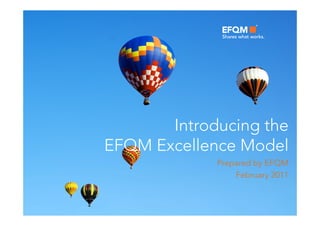More Related Content
Similar to Introducing the EFQM model
Similar to Introducing the EFQM model (20)
Introducing the EFQM model
- 2. What is EFQM?
EFQM is a non‐profit
foundation, based in
Brussels.
It was formed in 1988
by a group of leading
European organisations.
We are the custodians
of the EFQM Excellence
Model.
Together with our
European partners, we
have 30,000 member
organisations.
©2011 EFQM
- 3. The need for a Model
Given the complexities of today’s interconnected world, isolated efforts are no longer effective.
3
©2011 EFQM
- 4. EFQM Excellence Model 2010
Excellent organisations achieve and
sustain superior levels of performance
that meet or exceed the expectations
of all their stakeholders.
To achieve sustainable success, EFQM
provides guidance through a set of
three integrated components:
The Fundamental Concepts of
Excellence: The underlying principles
which are the essential foundation of
achieving sustainable excellence for
any organisation.
The EFQM Excellence Model: A
framework to help organisations to
convert the Fundamental Concepts
and RADAR thinking into practice.
RADAR logic: A simple but powerful
tool for driving systematic
improvement in all areas of the
organisation.
©2011 EFQM
- 5. Developing the Model
Customer Experience
Alignment
Leadership Organisational Agility
Process Optimisation Diversity
Sustainability Talent Management
Managing Change Stakeholder Focus
Resource Planning
Creativity
Employee Engagement Investing in the Future
Innovation Results Driven
Corporate Governance Flexibility
Operational Efficiency
©2011 EFQM
- 7. Concept Definitions (1)
Achieving Balanced Results
Excellent organisations meet their Mission and progress
towards their Vision through planning and achieving a
balanced set of results that meet both the short and long
term needs of their stakeholders and, where relevant,
exceed them.
Adding Value for Customers
Excellent organisations know that customers are their
primary reason for being and strive to innovate and create
value for them by understanding and anticipating their
needs and expectations.
©2011 EFQM
- 8. Concept Definitions (2)
Leading with Vision, Inspiration & Integrity
Excellent organisations have leaders who shape the future
and make it happen, acting as role models for its values
and ethics.
Managing by Process
Excellent organisations are managed through structured
and strategically aligned processes using fact‐based
decision making to create balanced and sustained results.
©2011 EFQM
- 9. Concept Definitions (3)
Succeeding through People
Excellent organisations value their people and create a
culture of empowerment for the balanced achievement of
organisational and personal goals.
Nurturing Creativity & Innovation
Excellent organisations generate increased value and levels
of performance through continual and systematic
innovation by harnessing the creativity of their
stakeholders.
©2011 EFQM
- 10. Concept Definitions (4)
Building Partnerships
Excellent organisations seek, develop and maintain
trusting relationships with various partners to ensure
mutual success. These partnerships may be formed with
customers, society, key suppliers, educational bodies or
Non‐Governmental Organisations (NGO).
Taking Responsibility for a Sustainable Future
Excellent organisations embed within their culture an
ethical mindset, clear values and the highest standards for
organisational behaviour, all of which enable them to
strive for economic, social and ecological sustainability.
©2011 EFQM
- 11. RADAR
Define the RESULTS Develop an integrated
you want to achieve set of APPROACHES
as part of your that will deliver these
strategy. results.
ASSESS & REFINE the
approaches based on DEPLOY the
analysis of the results approaches in a
achieved and learning systematic way.
activities.
©2011 EFQM
- 13. Enabler Criteria (1)
Leadership
Excellent organisations have leaders who shape the future and make it
happen, acting as role models for its values and ethics and inspiring trust
at all times. They are flexible, enabling the organisation to anticipate and
react in a timely manner to ensure the ongoing success of the
organisation.
Strategy
Excellent organisations implement their mission and vision by developing
a stakeholder focused strategy. Policies, plans, objectives and processes
are developed and deployed to deliver the strategy.
People
Excellent organisations value their people and create a culture that allows
the mutually beneficial achievement of organisational and personal goals.
They develop the capabilities of their people and promote fairness and
equality. They care for, communicate, reward and recognise, in a way that
motivates people, builds commitment and enables them to use their skills
and knowledge for the benefit of the organisation.
©2011 EFQM
- 14. Enabler Criteria (2)
Partnerships & Resources
Excellent organisations plan and manage external
partnerships, suppliers and internal resources in order to
support strategy and policies and the effective operation
of processes.
Processes, Products & Services
Excellent organisations design, manage and improve their
processes, products and services to generate increasing
value for customers and other stakeholders.
©2011 EFQM
- 15. Results Criteria (1)
Customer Results
Excellent organisations develop and agree a set of
performance indicators and related outcomes to
determine the successful deployment of their strategy and
supporting policies, based on the needs and expectations
of their customers.
People Results
Excellent organisations develop and agree a set of
performance indicators and related outcomes to
determine the successful deployment of their strategy and
supporting policies, based on the needs and expectations
of their people.
©2011 EFQM
- 16. Results Criteria (2)
Society Results
Excellent organisations develop and agree a set of
performance indicators and related outcomes to
determine the successful deployment of their societal and
ecological strategy and related policies, based on the
needs and expectations of the relevant external
stakeholders.
Key Results
Excellent organisations develop and agree a set of key
financial and non‐financial results to determine the
successful deployment of their strategy, based on the
needs and expectations of their key stakeholders.
©2011 EFQM
- 17. The Model in Action
Reduce
Recruitment Manage Productivity
Manage & Costs Customer
Motivate Relationship
People Review Reward Employee
& Benefits Reduce Supply Engagement
Turnover
Chain Costs
% Leads
Define & Converted
Manage Strategy Generate Sales Supplier Costs
Change
Repurchase
Rate
Develop New
Manage Total Expenses
Offerings
Budgets & Energy
Cash flow Consumption
Improve
Improve
Outsource Process % Profit
Profitability
Non‐Core Efficiency Waste
Processes
©2011 EFQM
